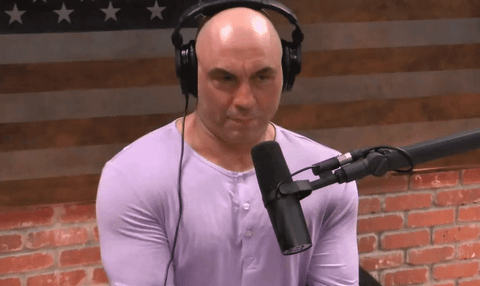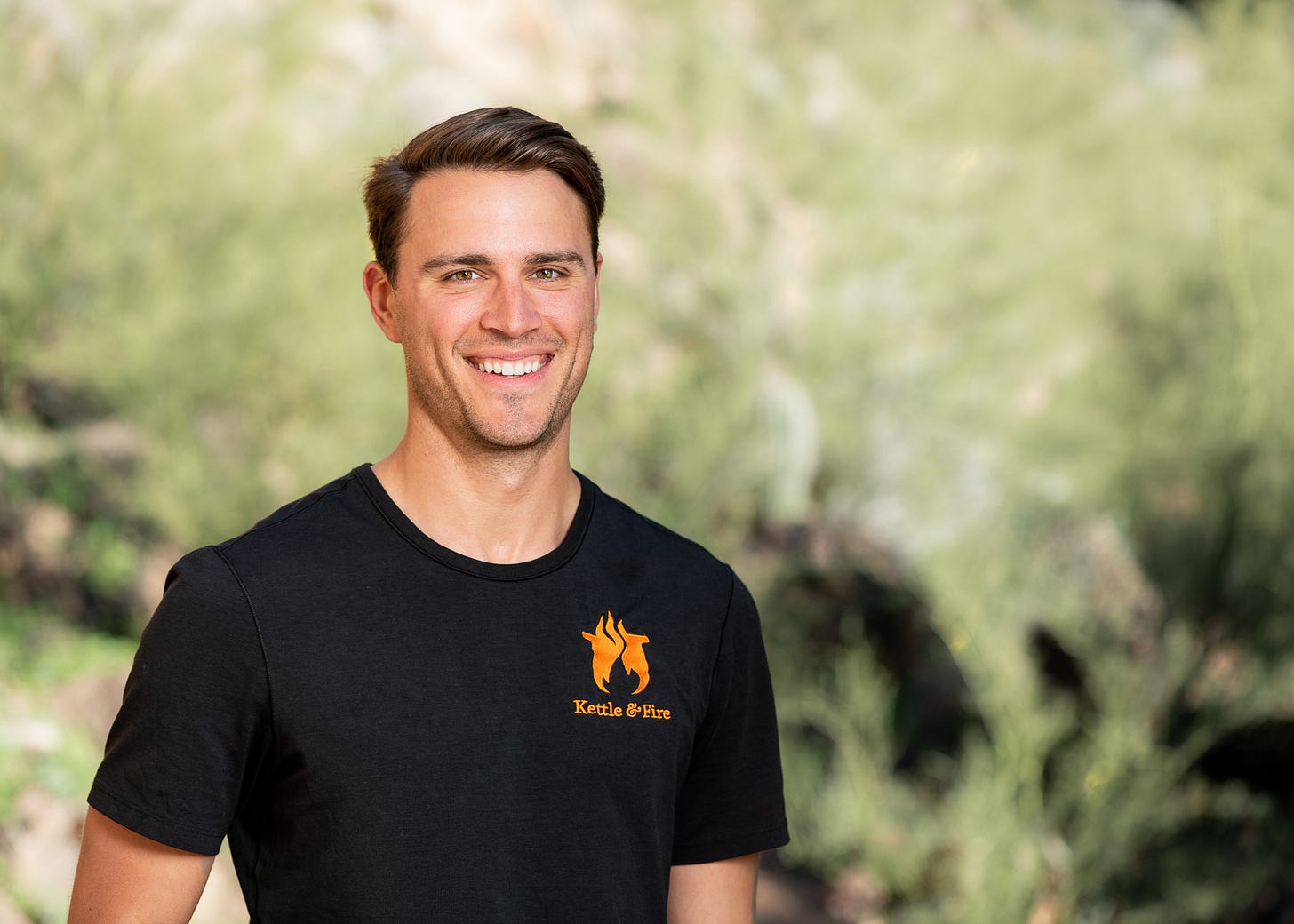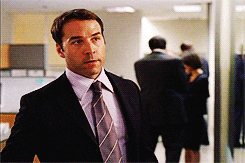And we’re back,

Back again with another edition of The Founder Newsletter - this is Episode 7. If you’re new here, my goal is to give you a quick synopsis of what got me thinking from this week’s episode of The Founder Podcast in 5 minutes or less.
If you missed them, check out previous episodes with Thursday Boots (DTC boots), Loopie (laundry), and Alpha (rapid research) [full list of founders/companies we’ve interviewed at the bottom, here’s the homepage]
(But what’s The Founder Podcast?)
The Founder Podcast is a weekly show where I sit down founders and have real-talk chats about the highs and lows of their entrepreneurial journeys. We cover things from where the spark for their idea/company came from and making prototypes to marketing tactics, wellness tips and what’s keeping them up at night.
Imagine if Joe Rogan and Guy Raz had a baby and named it Kallaway 👶. Then Kallaway made a podcast and called it The Founder.

I’ve found the conversations with founders to be really helpful for motivation, inspiration and generally fascinating to learn more about my favorite brands - I hope you do too.
Alright, to get this out of the way, here’s the:
Podcast show link (direct to Apple Podcasts)
Instagram (where I spend way too much time making quotes and audiogram content)
Discount codes from all our founders’ companies
Recommended learning resources from all our founders
(And who are you?)
I’m Kallaway - a future founder trying to get some answers before I jump in the ball pit myself. Let’s get it.
This Week’s Episode (Ep 7) 🥘
Justin Mares, Co-Founder and CEO of Kettle & Fire.
Listen to the episode on Apple Podcasts, Spotify, or Google
Use promo code “TheFounder” for 15% off all Kettle & Fire products (www.kettleandfire.com)
Justin also writes a sweet newsletter focused on health, wellness and brand building. Check it out here
A few interesting things we talk about on the podcast…
🍔 Why the current food industry is not set-up to make people healthy
🥘 What is bone broth and why is it so good for you?
📧 How Justin’s brother’s cold-email to Mark Cuban set up the company for success
😄 How to audit your role/industry fit and set yourself up for a future you’re excited by
📣 Why sharing what you’re working on is better than going stealth mode
Summary 🔍
What’s Kettle & Fire?
Kettle and Fire is the fastest growing bone broth brand in the US (say that 5 times fast). Today, they go to market with a variety of different bone broths and soups, including flavors like beef, chicken, turmeric ginger and coconut curry. They have scaled incredibly quickly since their launch in 2015.

There’s a couple things about Kettle & Fire that make them super unique and drive their cult-like following:
They use bones from cattle and chicken that are humanely raised, with no antibiotics or hormones, and are 100% grass-fed and grass-finished. And that matters. Because at the end of the day, the foods you’re consuming are only as good for you as the ingredients that made them. Kettle & Fire uses the highest quality sources on the planet in their bone broth.
They created innovative packaging that enables their products to stay fresh on the shelves for 2+ years. That means they can worry less about spoilage and more about product innovation and quality.
They are a brand first company. Many of the other competitors in the space are owned by large multi-national conglomerates. Kettle & Fire cares a lot about their brand and spends a disproportionate amount of time protecting it.
What is bone broth and why is it so good for you?
According to the Kettle & Fire site, “Bone broth is made from animal bones and connective tissue — typically cattle, chicken, or fish — that have been boiled into a broth and slow simmered for 20+ hours with herbs, vegetables, and spices.”
It’s essentially broth made by breaking down animal bones with an acid, like apple cider vinegar. It’s important to note that chicken bone broth is different than chicken stock. The difference lies in the cooking time and the part of the animal that is used. Bone broth is cooked for much longer than stock and while bone broth uses bones, stock uses the flesh of the animal. The longer cooking time of the bone broth increases the amount of nutrients that get extracted from the bones.
The reason bone broths are so popular (other than the great taste) are the tremendous health benefits. Some of those benefits include:
Better gut and digestive health
Better joint mobility
Skin, hair and nail growth
Better sleep
I love to break my fast with a cup of bone broth at around 1 or 2pm - there’s none better than Kettle & Fire. Use code “The Founder” to give it a try and you’ll get 15% off. I can’t think of a reason why not to at least try it.
Who’s Justin?
In short, Justin’s a beast. He got his start launching an eHarmony type site called “Roommate Fit” that matched college roommates based on personality.
After spending a few years in growth and marketing, writing this book, and creating a few online courses, he launched Kettle & Fire with his brother in 2015. If that wasn’t enough, he also co-founded Perfect Keto, a one-stop shop for keto foods, snacks and content.
His two brands did collectively almost $100M in revenue in 2019.

Justin’s Startup Manifesto 🗣️
What’s a Startup Manifesto?
At the end of every episode, I ask my founder guests the same question:
If you had to write a Startup Manifesto with 5 of the most important key lessons or pitfalls to avoid when starting out, what would they be?
Here’s what Justin had to say:
Startup Manifesto 📜
Only work with people that you think are high integrity and you want to spend time with. For our first funding round for Kettle & Fire, we had someone that I thought would be helpful, but I didn’t necessarily respect or admire. Bringing them on as an investor ended up being a tremendous mistake.
Hire people that you think are really smart, will get the job done and have done the job you want them to do before.
Understand when you’re hiring for value protection roles (e.g., finance, legal, operations, etc.) vs value creation roles (e.g., marketing, sales, product, etc.). Understanding that really helps you filter someone when you interview them and review their background.
Build conviction and only pursue something you feel strongly about. This game is just tough and if you do it well, then you’re going to be surrounded by people in your industry and other people that are starting companies in your problem space all the time.
Focus on the things that are material (e.g., relationships, money in the bank, getting good at a skill, developing a craft, building a brand, talking to your customers, etc.). Focus wayyyyy more on those vs things that make you feel good/successful (e.g., PR traps, being a social media influencer, spending time on Twitter, etc.)
Justin’s Thoughts 💭
On pursuing things you actually care about…
“I think this is something I underappreciated at Exceptional (startup Justin worked at before starting Kettle & Fire). If I am successful at running growth for this suite of software tools, I’m going to be spending all of my time around software developers and people who are marketing to software developers.

So if that’s not exciting to me, I shouldn’t win at this game I’m playing and then once I’ve won be like, ‘Oh shit, this is actually not a life I’m excited about because this is not what I wanna do, it’s not a space I care about, it’s not full of people I want to be around.’”
On big CPG and why they aren’t good for you…
These big CPG companies have been around for over 100 years - every public CPG has been around for 100+ years except for Tyson. These guys are just not making products that are good for people.
You see it in rising obesity rates. You see it in rising healthcare costs. you just see it across the board - what the average person in America eats is just fucking their health.
I’m hopeful that we’re at the start of a revolution, just a wholesale change, in the types of product that people put in their bodies and what people consume.
I think that the status quo of 70% of Americans being overweight, 50%+ being obese, healthcare costs that are 1/3 of GDP just does not feel like a sustainable solution to me. In my mind, the easiest way to change that, is to control what people are putting in their diets.”
On market trends that are exciting as a consumer or investor…
“The most valuable companies are the ones that solve the biggest problems. I’m less interested in what startups are interesting and likely to do well, and much more interested in what companies are likely to solve big problems.
I’m pretty bullish on the next decade of starting consumer brands in the health and wellness space. I’m pretty bullish on anything that can materially drive down the cost of health care. I’m pretty bullish on things that provide decentralized alternatives to large centralized organizations or government agencies that are doing a bad job right now.
There’s also technology adoption curves that are getting pretty interesting. Things in VR/AR are getting pretty interesting, crypto is probably 5 years from having 10 companies worth over a billion dollars, or maybe like 100 companies worth over a billion dollars. The cost curve of genetic sequencing is coming down at a faster rate than Moore’s Law which will enable a bunch of interesting stuff.
You see a virus 10x more deadly than the flu has shut down every major economy in the world so you’re like, okay, biotech is going to be a massive thing because there’s no possible way that all the economies in the world can shut down every time a more deadly flu comes along.”
What Got Me Thinking From the Episode 🤔
After reflecting on my conversation with Justin, here’s something that really got my wheels spinning:
Reverse Engineering your End Goal 🎯
Justin’s quote above about pursuing a role/opportunity in a space you actually want to be in really struck a cord with me.
He said that although he was good at his role (running growth at a company that sold software tools to developers), he started to realize that he was hanging out with developers all day. He was self-aware enough to know that’s not what he wanted to be doing and the better he got at his job, the more he was going to be exposed to those types of people in that industry.
I think it’s critical for people to recognize this as early as possible - and something I have personally struggled with heavily.
A lot of us are coached to try and break into the most prestigious field as possible out of undergrad (e.g., investment banking or consulting, etc.) and then keep pursuing high paying jobs regardless of the role or industry fit.

Being completely honest with yourself about what you’re actually interested in and then making a play to find a company of the size you’d like to work for, seems to be the fastest way to finding happiness with your job.
Take Justin for example - he genuinely spent a lot of his free time and energy thinking about health and wellness. So much so that when his brother tore his ACL and needed a better diet to get healthier faster, Justin was the one that proposed bone broth in the first place. I didn’t ask him this explicitly, but I bet it was easier to jump at trying to launch the bone broth idea than a lot of his other ideas because he had genuine interest in the space.
And this goes for founders, but also anybody who is looking for a job they might like more than their current one. Try this:
Think about what you enjoy doing, reading, thinking about, talking about
Figure out how that maps to an industry
Think about if you’d like to work for a smaller, fast paced company with lots of responsibility or a bigger, slower growing company with more hierarchy
Make a list of 10 companies that fit in your “industry & size” cross section
That’s where you should start focusing your time when looking for a change
What’d I miss?
Wrapping it Up 📕
I hope you found this semi-interesting and inspiring/helpful in any way. If so and you want to help support The Founder, here’s a couple things that would be valuable to me and the show:
If you enjoyed this post, share it with a friend you think is on the same wavelength. Can’t hurt and would help spread the word!
If you haven’t already, subscribe to the newsletter so you can get them delivered to your inbox each week!
Listen to the full podcast episode with Justin on Apple or Spotify. Or, if you don’t have an hour to listen to the full episode, pick a couple topics and skim through (topic time codes in the show notes).
If you’re feeling super giving:
Go to the show on Apple Podcasts, subscribe, give a 5-star rating and a couple sentence positive review - https://apple.co/2VCosu6
Give our Instagram a follow - I promise you won’t regret it!
Till next time ✌️
Kallaway



